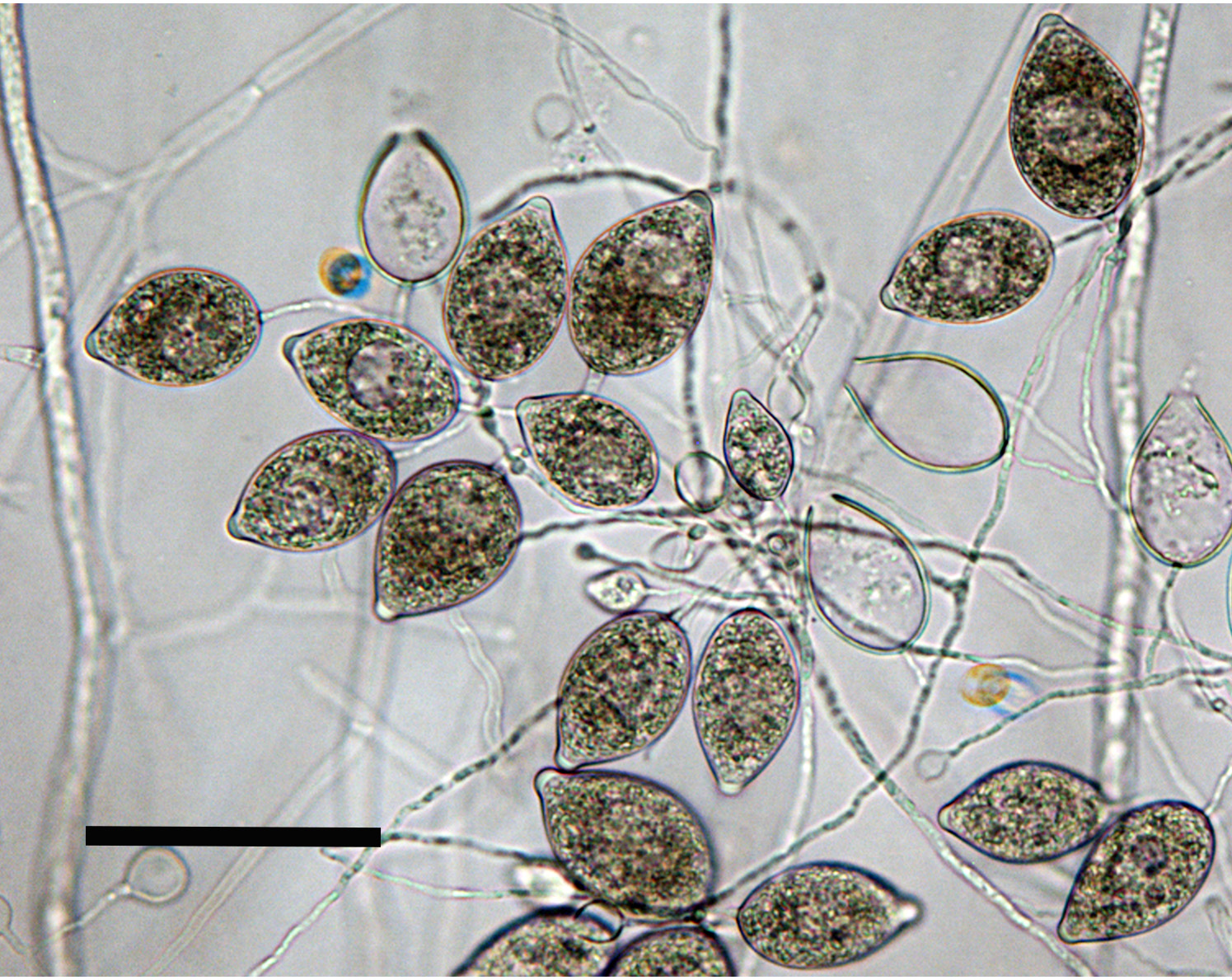Gallery
Image Type
Morphological Structure
Clades
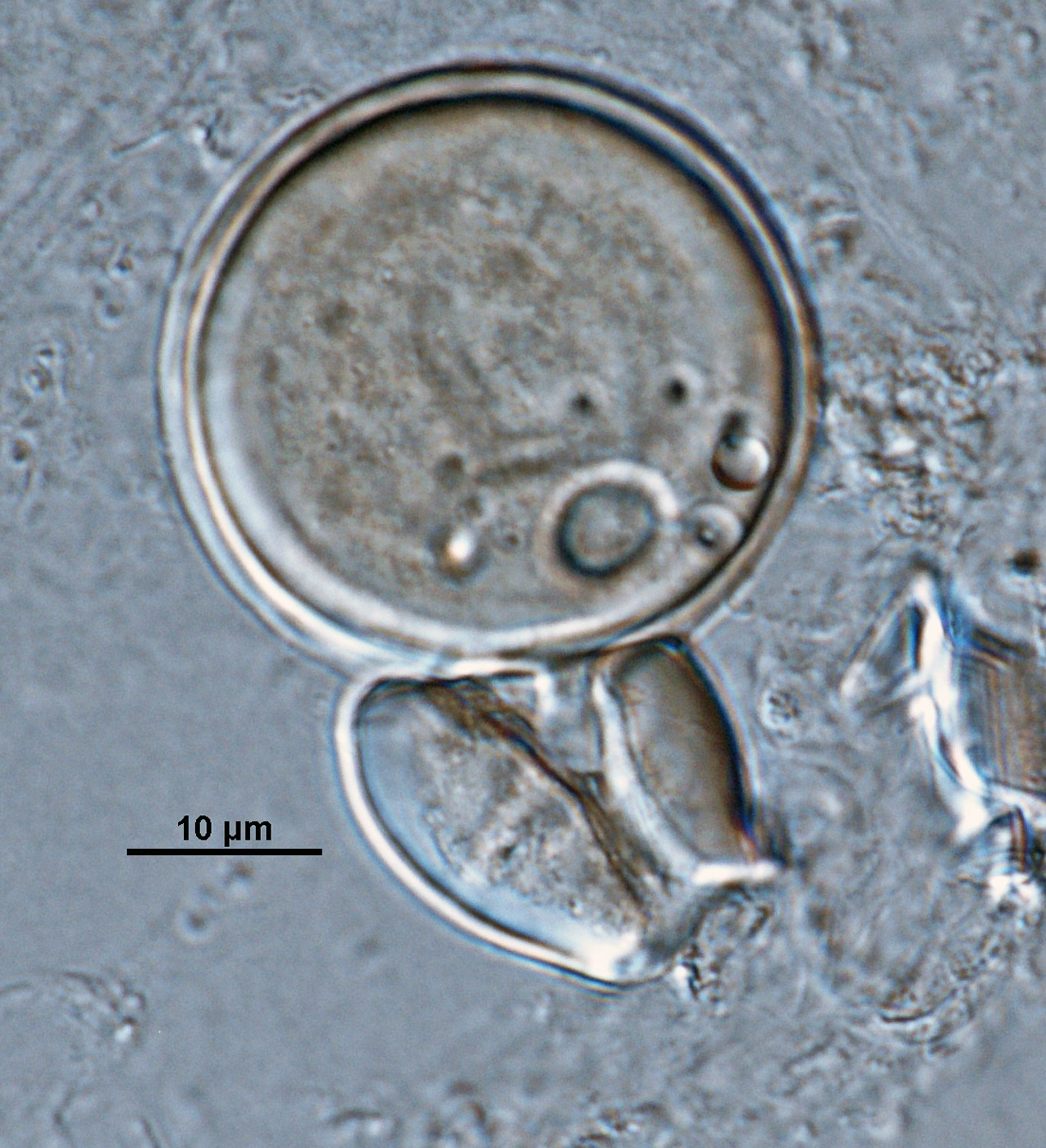 Phytophthora infestans nbsp;(A1 x A2) heterothallic sexual phase: (andash;d) smooth-walled oogoniumnbsp;with amphigynous antheridiumnbsp;and a plerotic oospore; photonbsp;by Gloria Abad USDA-APHIS-PPQ.
Phytophthora infestans nbsp;(A1 x A2) heterothallic sexual phase: (andash;d) smooth-walled oogoniumnbsp;with amphigynous antheridiumnbsp;and a plerotic oospore; photonbsp;by Gloria Abad USDA-APHIS-PPQ.
Phytophthora infestans (A1 x A2) heterothallic sexual phase: (a–d) smooth-walled oogonium with amphigynous antheridium and a plerotic oospore; photo by Gloria Abad USDA-APHIS-PPQ.
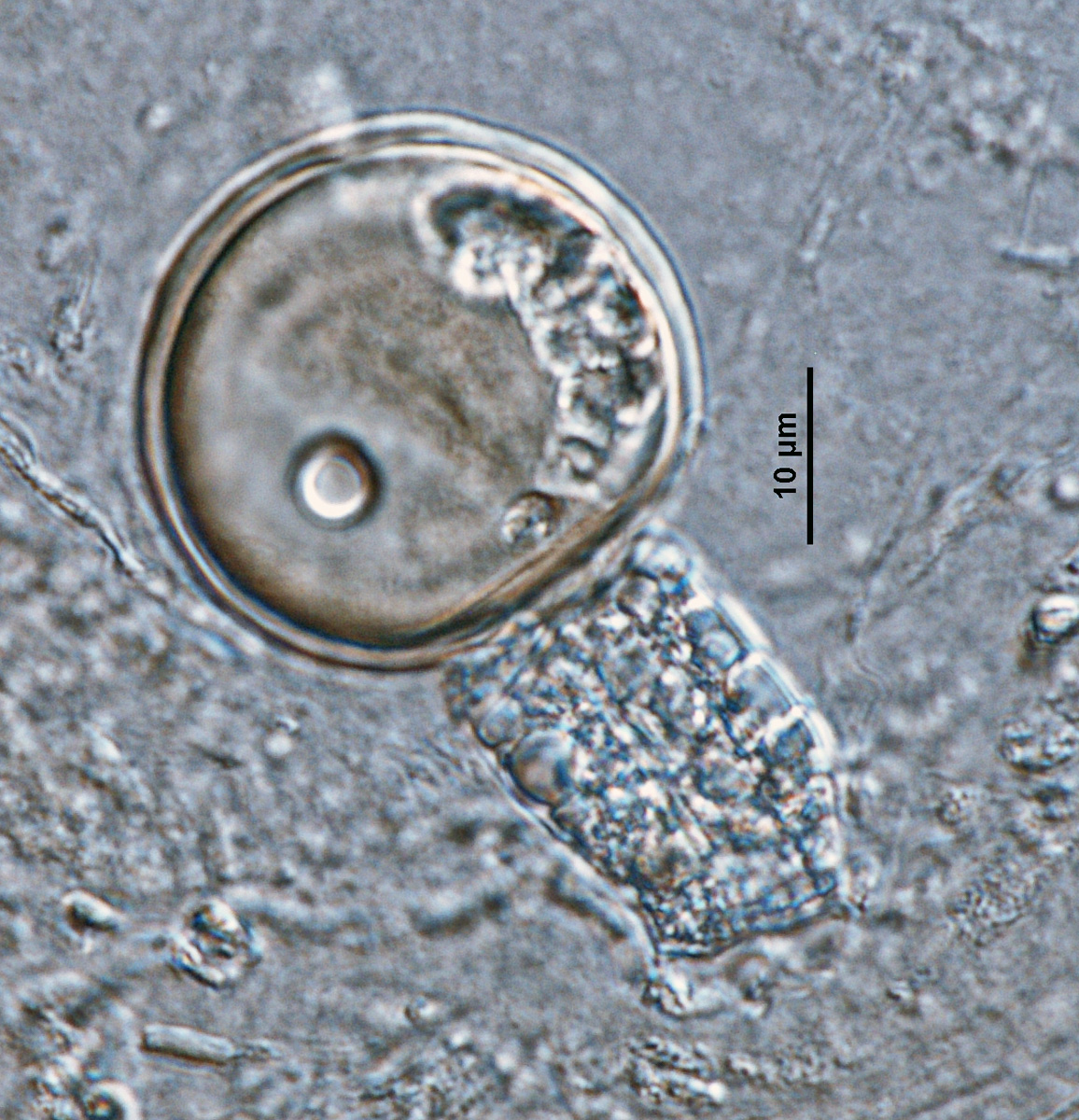 Phytophthora infestans nbsp;(A1 x A2) heterothallic sexual phase: (andash;d) smooth-walled oogoniumnbsp;with amphigynous antheridiumnbsp;and a plerotic oospore; photonbsp;by Gloria Abad USDA-APHIS-PPQ.
Phytophthora infestans nbsp;(A1 x A2) heterothallic sexual phase: (andash;d) smooth-walled oogoniumnbsp;with amphigynous antheridiumnbsp;and a plerotic oospore; photonbsp;by Gloria Abad USDA-APHIS-PPQ.
Phytophthora infestans (A1 x A2) heterothallic sexual phase: (a–d) smooth-walled oogonium with amphigynous antheridium and a plerotic oospore; photo by Gloria Abad USDA-APHIS-PPQ.
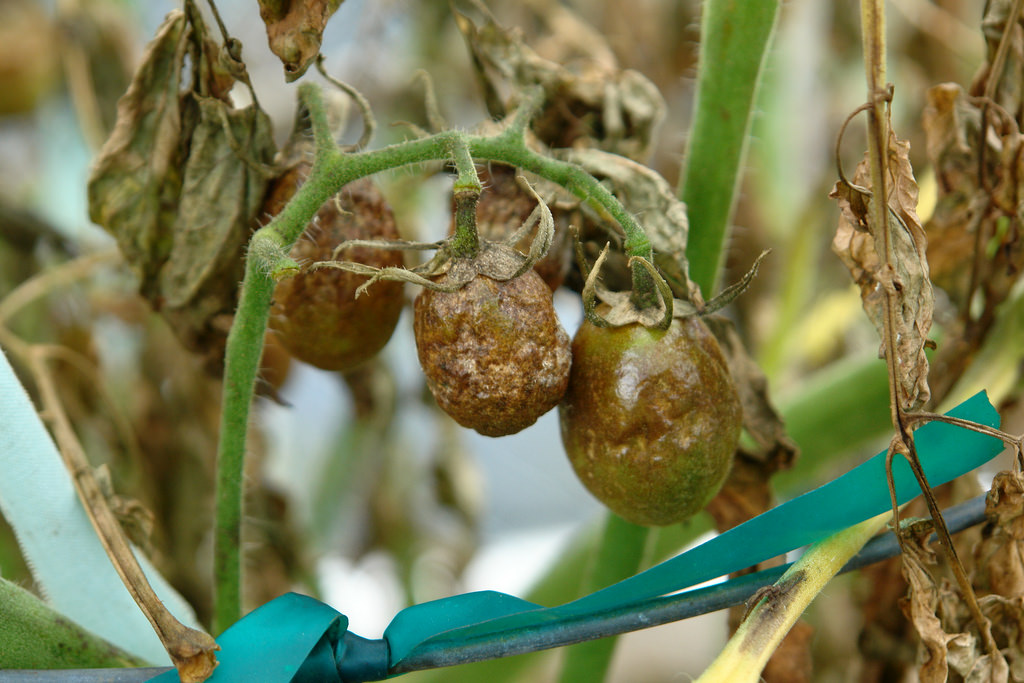 late blight fruit rot of tomato ( Lycopersicon esculentum ) in a garden near Hilo, Hawaii, caused by Phyophthora infestans ; photo by Scot Nelson, University of Hawaii at Manoa
late blight fruit rot of tomato ( Lycopersicon esculentum ) in a garden near Hilo, Hawaii, caused by Phyophthora infestans ; photo by Scot Nelson, University of Hawaii at Manoa
late blight fruit rot of tomato (Lycopersicon esculentum) in a garden near Hilo, Hawaii, caused by Phyophthora infestans; photo by Scot Nelson, University of Hawaii at Manoa
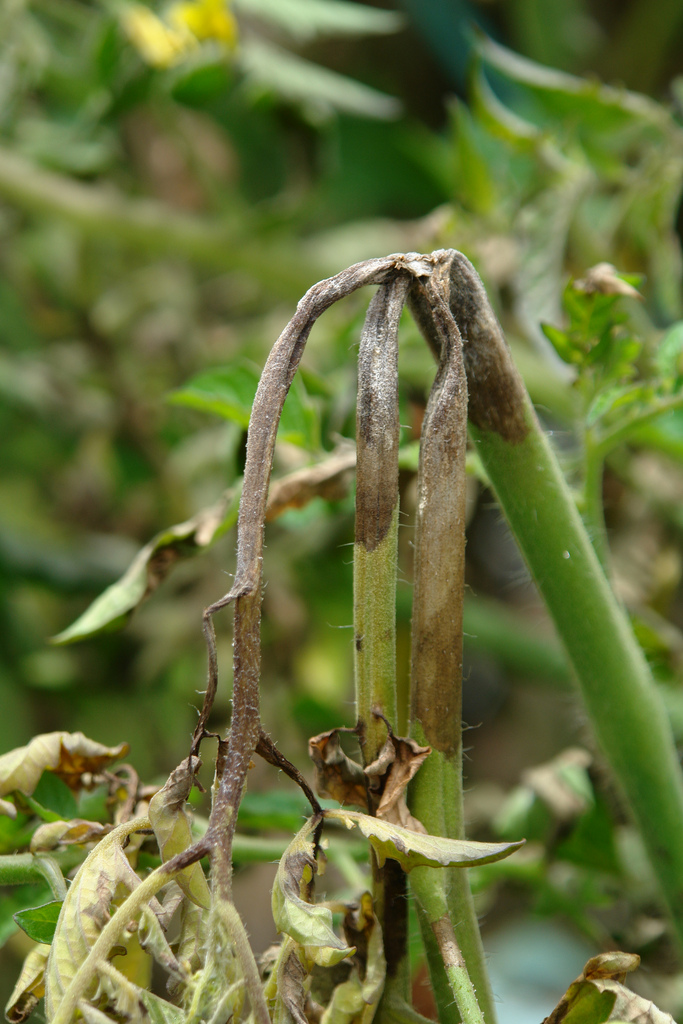 late blight stem collapse of tomato ( Lycopersicon esculentum ) in a garden near Hilo, Hawaii, caused by Phyophthora infestans ; photo by Scot Nelson, University of Hawaii at Manoa
late blight stem collapse of tomato ( Lycopersicon esculentum ) in a garden near Hilo, Hawaii, caused by Phyophthora infestans ; photo by Scot Nelson, University of Hawaii at Manoa
late blight stem collapse of tomato (Lycopersicon esculentum) in a garden near Hilo, Hawaii, caused by Phyophthora infestans; photo by Scot Nelson, University of Hawaii at Manoa
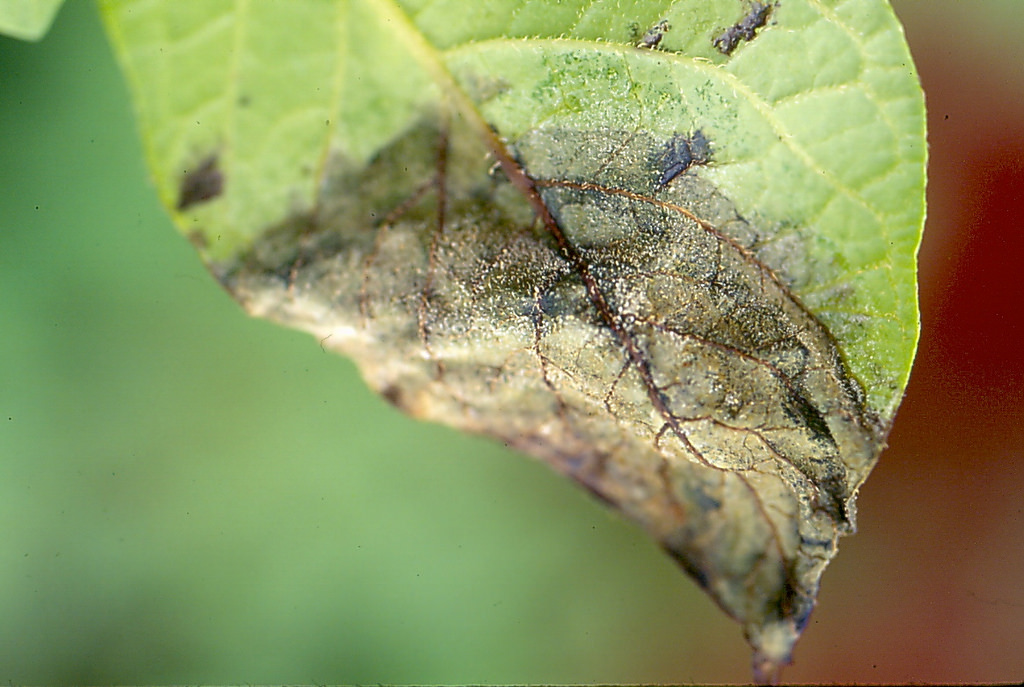 late blight of potato ( Solanum tuberosum ), caused by Phytophthora infestans ; photo by Scot Nelson, University of Hawaii at Manoa
late blight of potato ( Solanum tuberosum ), caused by Phytophthora infestans ; photo by Scot Nelson, University of Hawaii at Manoa
late blight of potato (Solanum tuberosum), caused by Phytophthora infestans; photo by Scot Nelson, University of Hawaii at Manoa
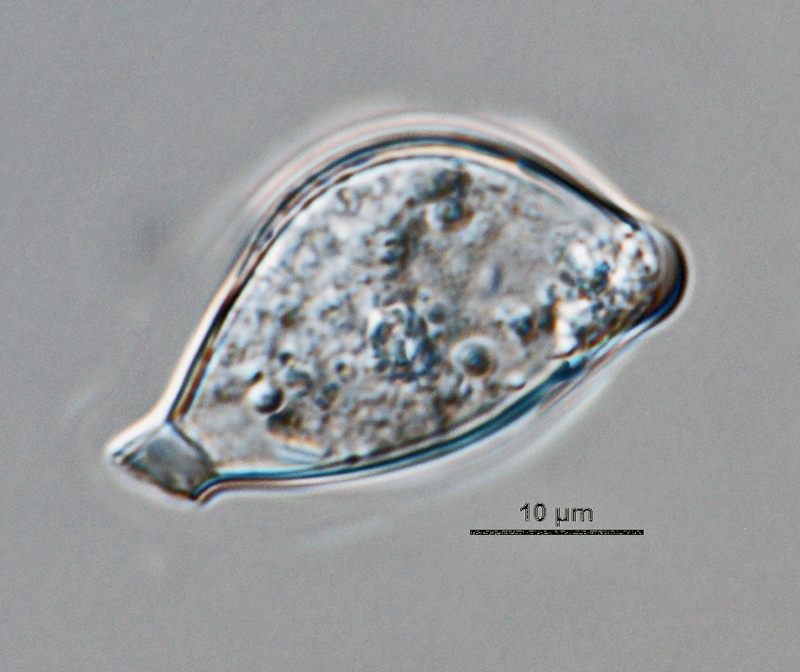 Phytophthora infestans nbsp;(CPHST BL 142, selected specimen) asexual phase: semipapillatenbsp;caducousnbsp;sporangium with short pedicel;nbsp;photo by Gloria Abad, USDA-APHIS.
Phytophthora infestans nbsp;(CPHST BL 142, selected specimen) asexual phase: semipapillatenbsp;caducousnbsp;sporangium with short pedicel;nbsp;photo by Gloria Abad, USDA-APHIS.
Phytophthora infestans (CPHST BL 142, selected specimen) asexual phase: semipapillate caducous sporangium with short pedicel; photo by Gloria Abad, USDA-APHIS.
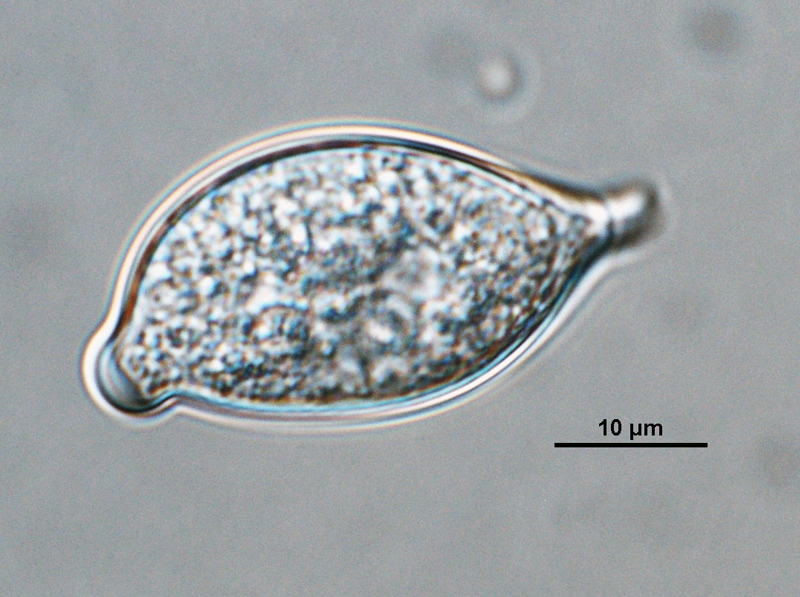 Phytophthora infestans nbsp;(CPHST BL 142, selected specimen) asexual phase: semipapillatenbsp;caducousnbsp;sporangium with short pedicel;nbsp;photo by Gloria Abad, USDA-APHIS.
Phytophthora infestans nbsp;(CPHST BL 142, selected specimen) asexual phase: semipapillatenbsp;caducousnbsp;sporangium with short pedicel;nbsp;photo by Gloria Abad, USDA-APHIS.
Phytophthora infestans (CPHST BL 142, selected specimen) asexual phase: semipapillate caducous sporangium with short pedicel; photo by Gloria Abad, USDA-APHIS.
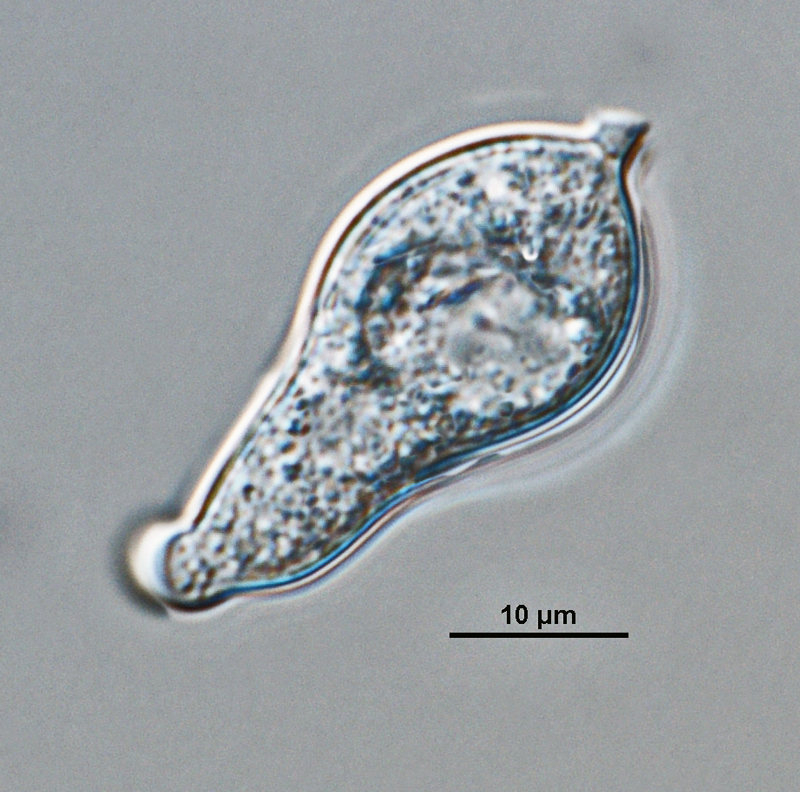 Phytophthora infestans nbsp;(CPHST BL 142, selected specimen) asexual phase: semipapillatenbsp;caducousnbsp;sporangium with short pedicel;nbsp;photo by Gloria Abad, USDA-APHIS.
Phytophthora infestans nbsp;(CPHST BL 142, selected specimen) asexual phase: semipapillatenbsp;caducousnbsp;sporangium with short pedicel;nbsp;photo by Gloria Abad, USDA-APHIS.
Phytophthora infestans (CPHST BL 142, selected specimen) asexual phase: semipapillate caducous sporangium with short pedicel; photo by Gloria Abad, USDA-APHIS.
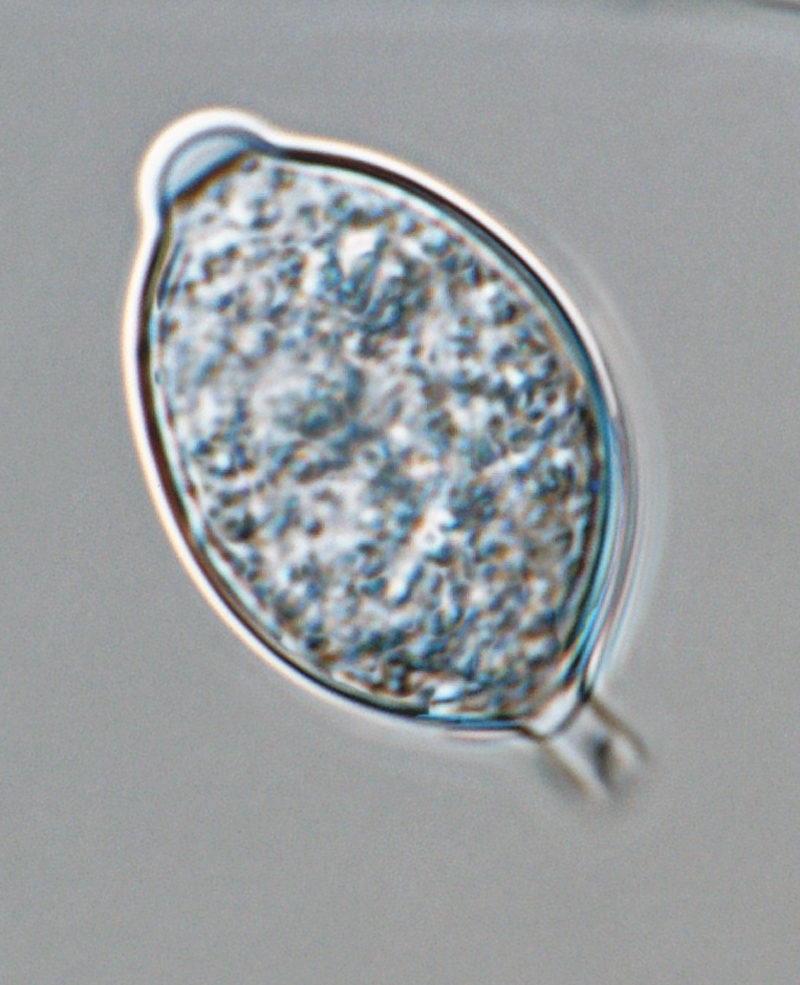 Phytophthora infestans nbsp;(CPHST BL 142, selected specimen) asexual phase: semipapillatenbsp;caducousnbsp;sporangium with short pedicel;nbsp;photo by Gloria Abad, USDA-APHIS.
Phytophthora infestans nbsp;(CPHST BL 142, selected specimen) asexual phase: semipapillatenbsp;caducousnbsp;sporangium with short pedicel;nbsp;photo by Gloria Abad, USDA-APHIS.
Phytophthora infestans (CPHST BL 142, selected specimen) asexual phase: semipapillate caducous sporangium with short pedicel; photo by Gloria Abad, USDA-APHIS.
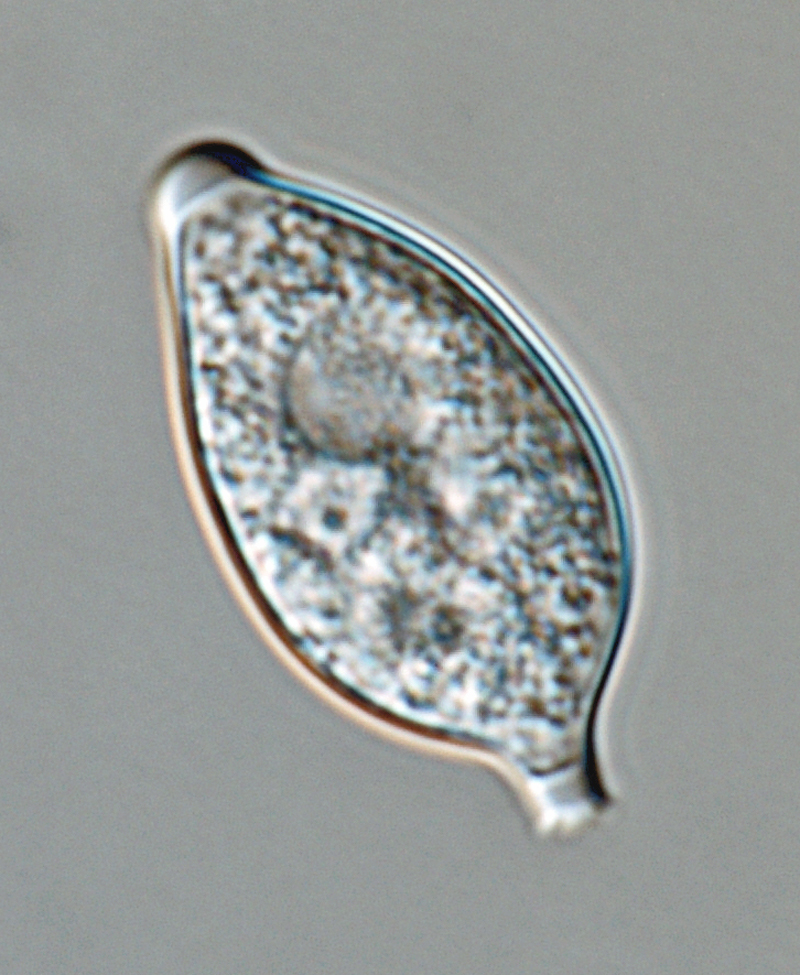 Phytophthora infestans nbsp;(CPHST BL 142, selected specimen) asexual phase: semipapillatenbsp;caducousnbsp;sporangium with short pedicel;nbsp;photo by Gloria Abad, USDA-APHIS.
Phytophthora infestans nbsp;(CPHST BL 142, selected specimen) asexual phase: semipapillatenbsp;caducousnbsp;sporangium with short pedicel;nbsp;photo by Gloria Abad, USDA-APHIS.
Phytophthora infestans (CPHST BL 142, selected specimen) asexual phase: semipapillate caducous sporangium with short pedicel; photo by Gloria Abad, USDA-APHIS.
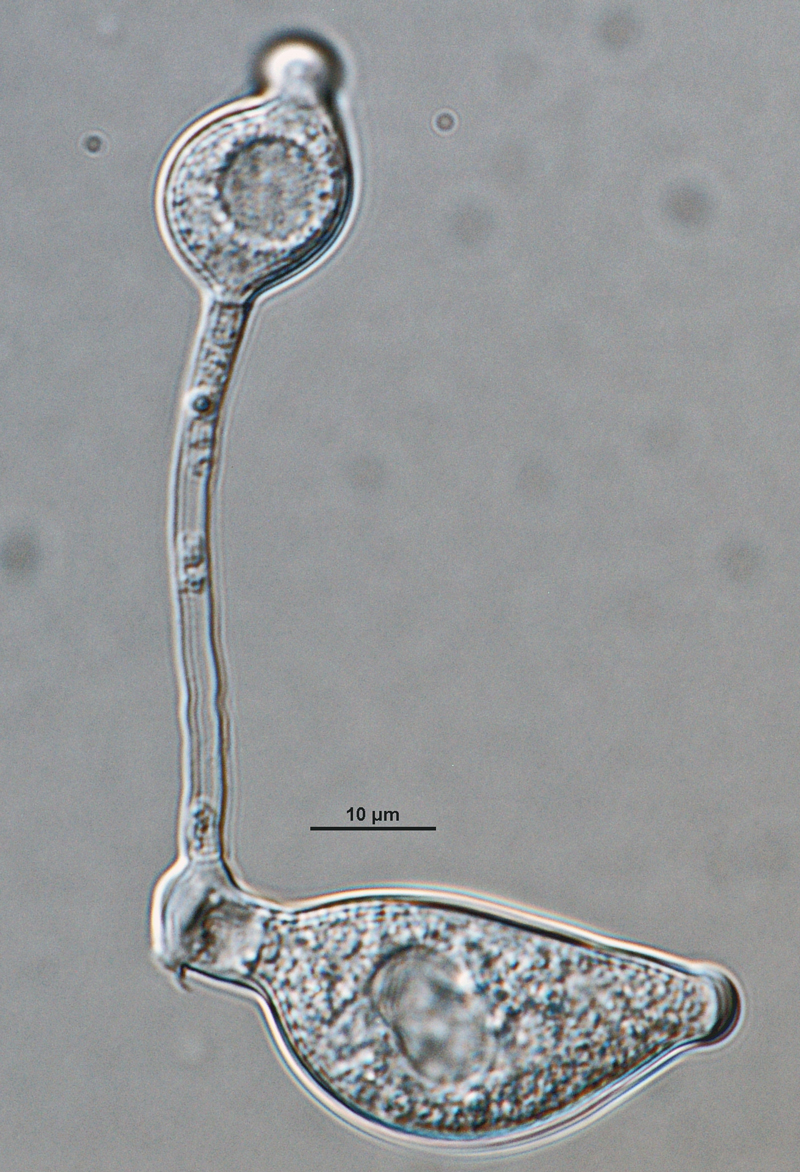 Phytophthora infestans (CPHST BL 142, selected specimen) asexual phase: sporangia external germination; photo by Gloria Abad, USDA-APHIS.
Phytophthora infestans (CPHST BL 142, selected specimen) asexual phase: sporangia external germination; photo by Gloria Abad, USDA-APHIS.
Phytophthora infestans (CPHST BL 142, selected specimen) asexual phase: sporangia external germination; photo by Gloria Abad, USDA-APHIS.
Phytophthora spp. in subclade 9b: portion of the seven-loci ML phylogeny featuring the type cultures of 212 described species (by T. Bourret). Notice the position of P. insolita Ex-type CBS 691.79 = S&T BL 144. Gloria Abad, USDA S&T.
Phytophthora spp. in subclade 9b: Morphological Tabular key (PDF) and Tabular key legends (PDF) in IDphy2 KEY SECTION. Notice the data of P. insolita Ex-type CBS 691.79 = S&T BL 144. Gloria Abad, USDA S&T.
 Phytophthora insolita (CPHST BL 144) colonies of the ex-type grown for 7 days on (a) V8reg; Agar, (b) potato dextrose agar, and (c) malt extract agar; photo by Krysta Jennings and Leandra Knight, USDA-APHIS-PPQ
Phytophthora insolita (CPHST BL 144) colonies of the ex-type grown for 7 days on (a) V8reg; Agar, (b) potato dextrose agar, and (c) malt extract agar; photo by Krysta Jennings and Leandra Knight, USDA-APHIS-PPQ
Phytophthora insolita (CPHST BL 144) colonies of the ex-type grown for 7 days on (a) V8® Agar, (b) potato dextrose agar, and (c) malt extract agar; photo by Krysta Jennings and Leandra Knight, USDA-APHIS-PPQ
Phytophthora insolita (ex-type CPHST BL 144) asexual and sexual phases: (a, b) nonpapillated persistent sporangia originated in unbranched sporangiophores; (c) internal proliferation; (d) thin-walled chlamydospores and thin-walled oospore (red arrow), (e, f) hyphal swellings and oospores, (g–i) sexual stage without antheridia rarely produced; photos by Gloria Abad, USDA-APHIS-PPQ.
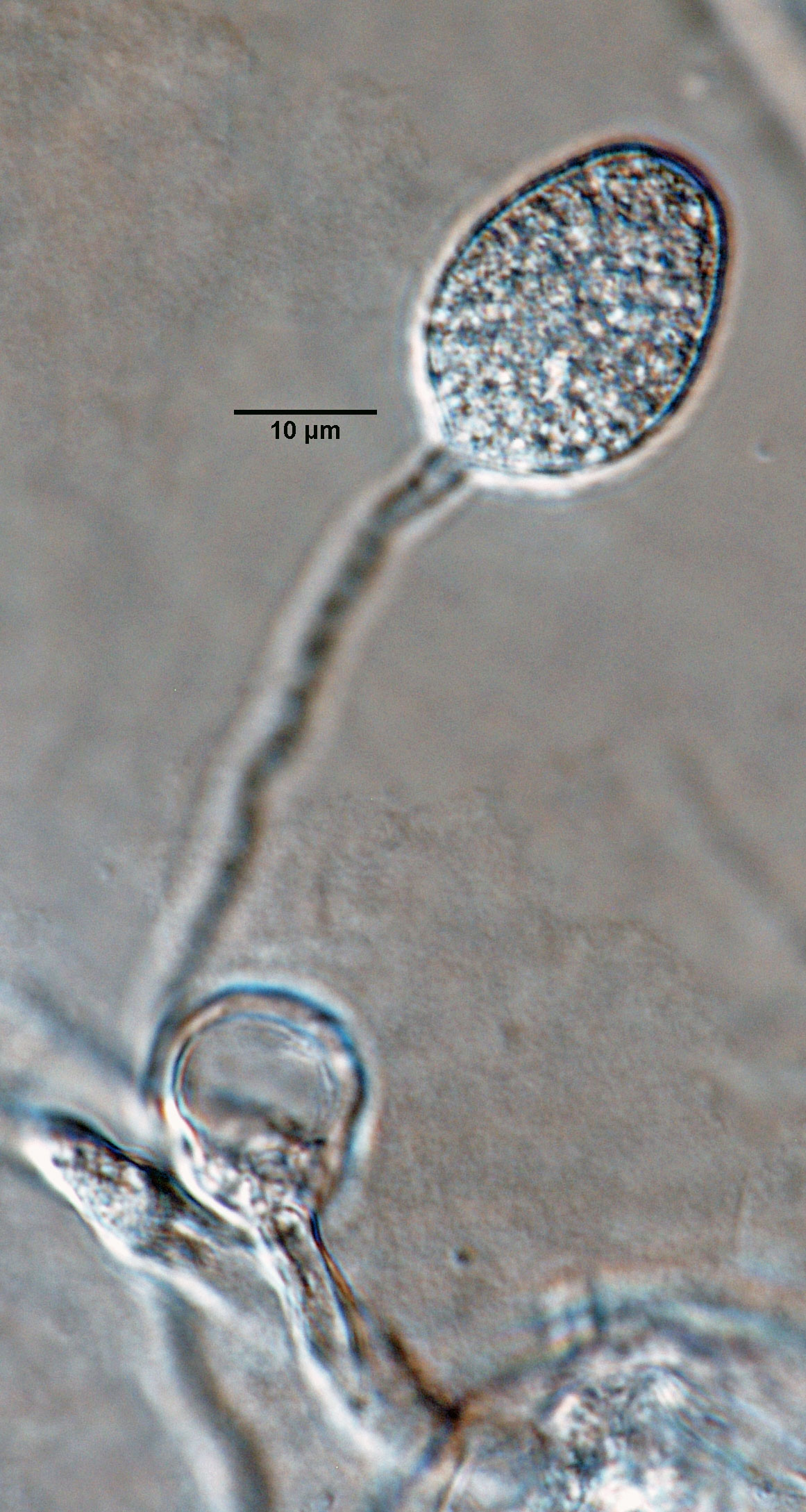 Phytophthora insolita nbsp;(ex-type CPHST BL 144) asexual phase:nbsp;nonpapillated persistent sporangiumnbsp;originated in unbranched sporangiophore; photo by Gloria Abad, USDA-APHIS-PPQ.
Phytophthora insolita nbsp;(ex-type CPHST BL 144) asexual phase:nbsp;nonpapillated persistent sporangiumnbsp;originated in unbranched sporangiophore; photo by Gloria Abad, USDA-APHIS-PPQ.
Phytophthora insolita (ex-type CPHST BL 144) asexual phase: nonpapillated persistent sporangium originated in unbranched sporangiophore; photo by Gloria Abad, USDA-APHIS-PPQ.
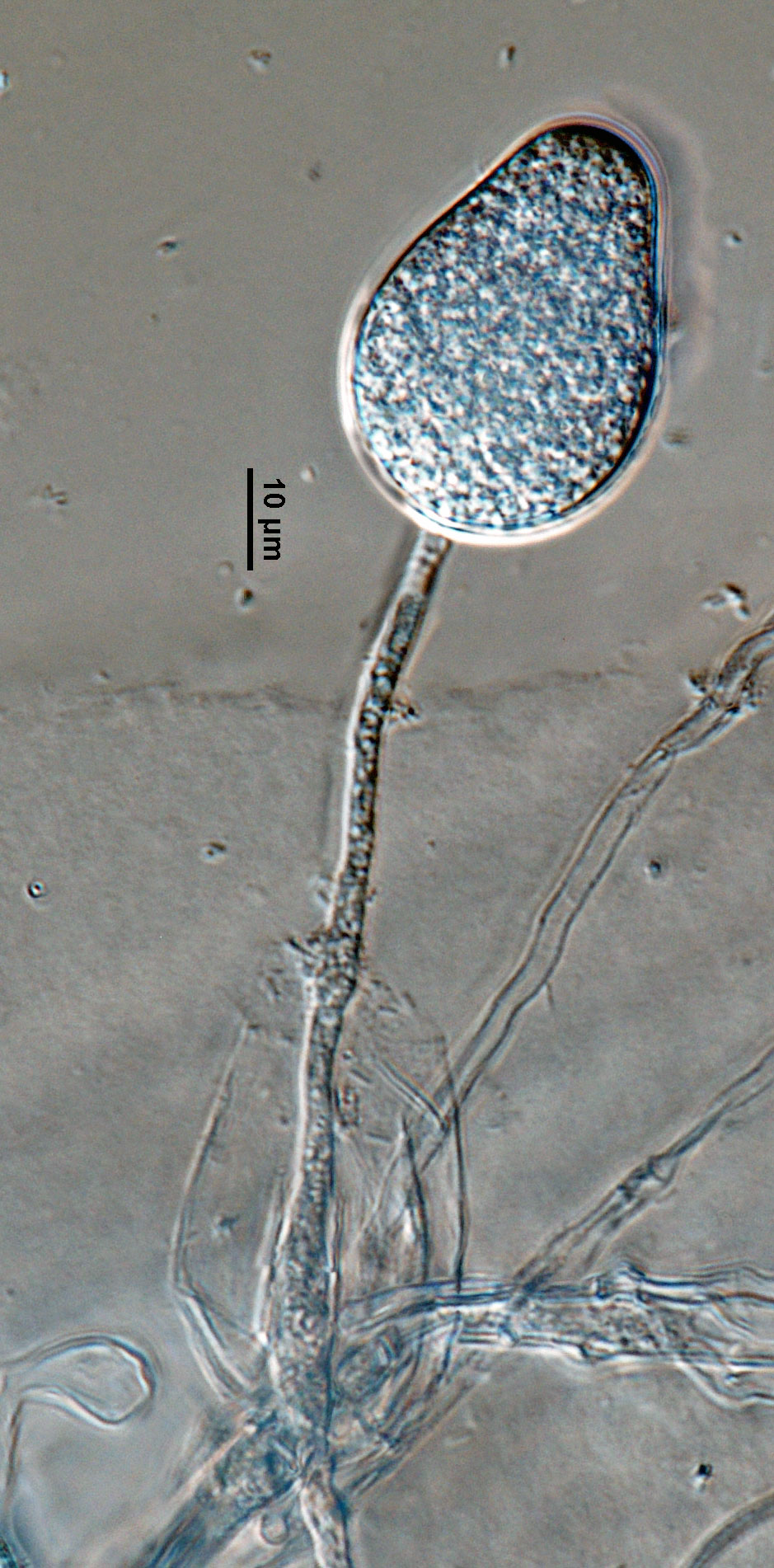 Phytophthora insolita nbsp;(ex-type CPHST BL 144) asexual phase: nonpapillated persistent sporangiumnbsp;originated in unbranched sporangiophore; photo by Gloria Abad, USDA-APHIS-PPQ.
Phytophthora insolita nbsp;(ex-type CPHST BL 144) asexual phase: nonpapillated persistent sporangiumnbsp;originated in unbranched sporangiophore; photo by Gloria Abad, USDA-APHIS-PPQ.
Phytophthora insolita (ex-type CPHST BL 144) asexual phase: nonpapillated persistent sporangium originated in unbranched sporangiophore; photo by Gloria Abad, USDA-APHIS-PPQ.
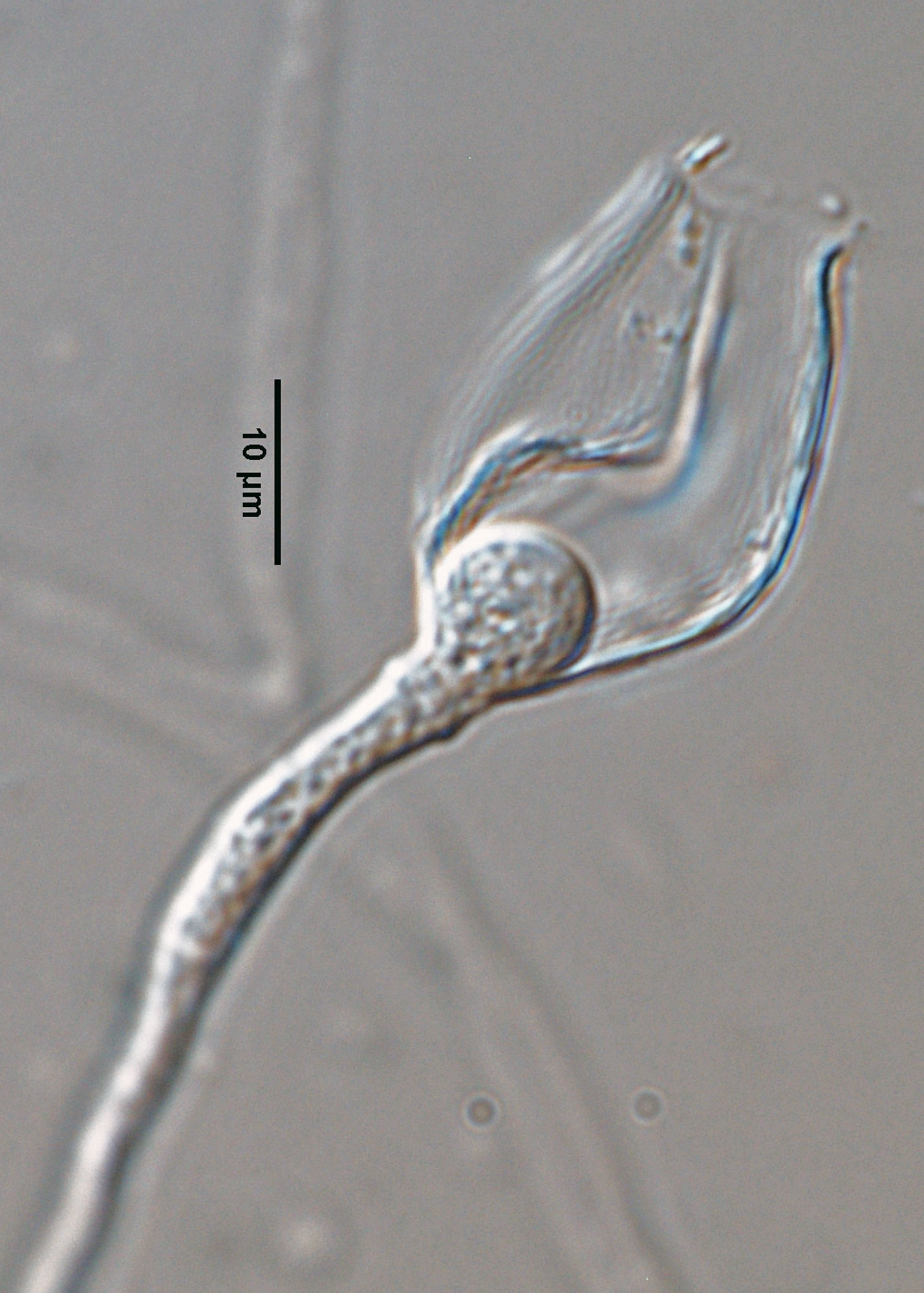 Phytophthora insolita (ex-type CPHST BL 144) asexual phase: internal proliferation of sporangium; photo by Gloria Abad, USDA-APHIS-PPQ.
Phytophthora insolita (ex-type CPHST BL 144) asexual phase: internal proliferation of sporangium; photo by Gloria Abad, USDA-APHIS-PPQ.
Phytophthora insolita (ex-type CPHST BL 144) asexual phase: internal proliferation of sporangium; photo by Gloria Abad, USDA-APHIS-PPQ.
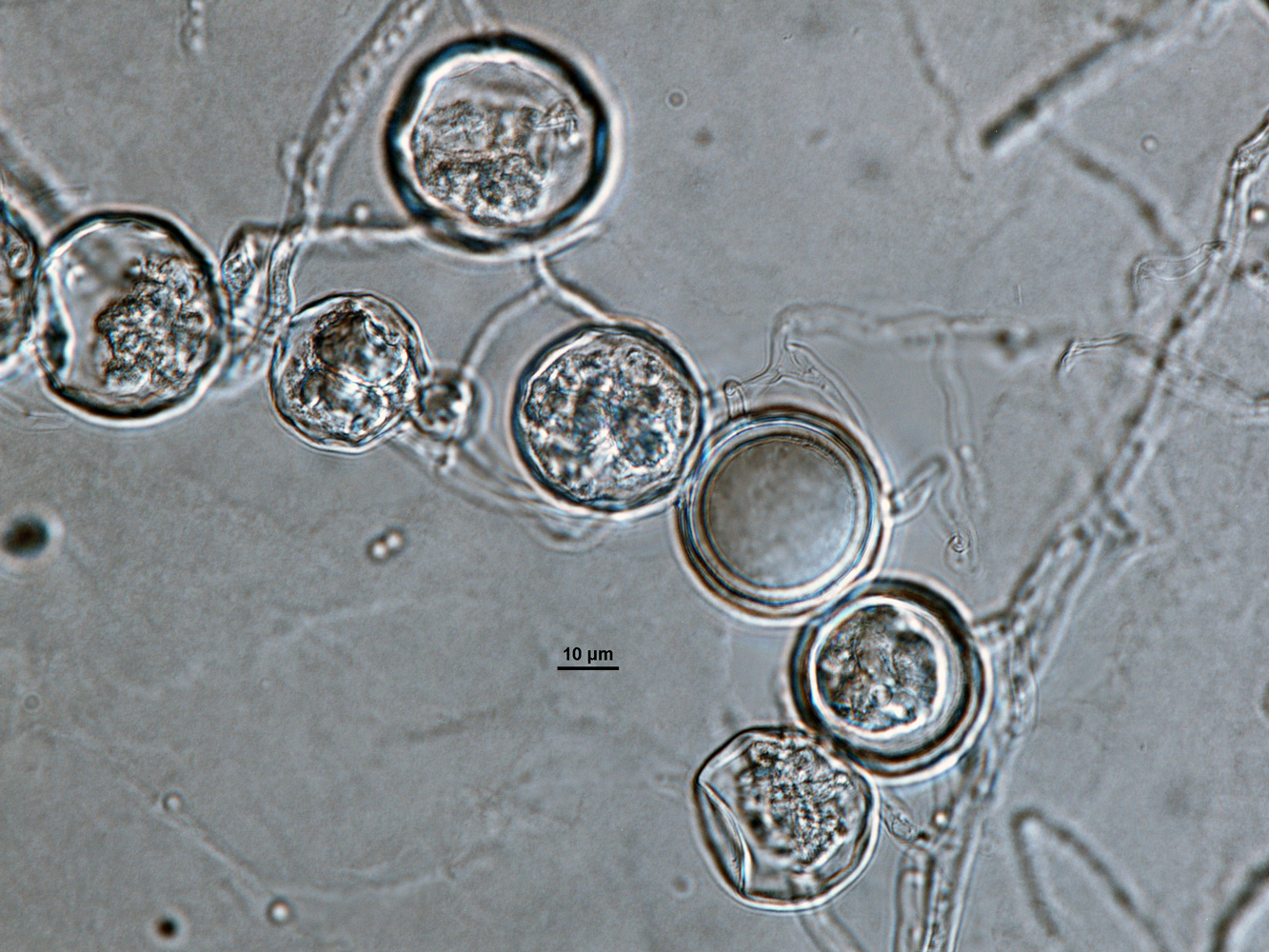 Phytophthora insolita (ex-type CPHST BL 144) asexual and sexual phases: thin-walled chlamydospores and thin-walled oospore; photo by Gloria Abad, USDA-APHIS-PPQ.
Phytophthora insolita (ex-type CPHST BL 144) asexual and sexual phases: thin-walled chlamydospores and thin-walled oospore; photo by Gloria Abad, USDA-APHIS-PPQ.
Phytophthora insolita (ex-type CPHST BL 144) asexual and sexual phases: thin-walled chlamydospores and thin-walled oospore; photo by Gloria Abad, USDA-APHIS-PPQ.
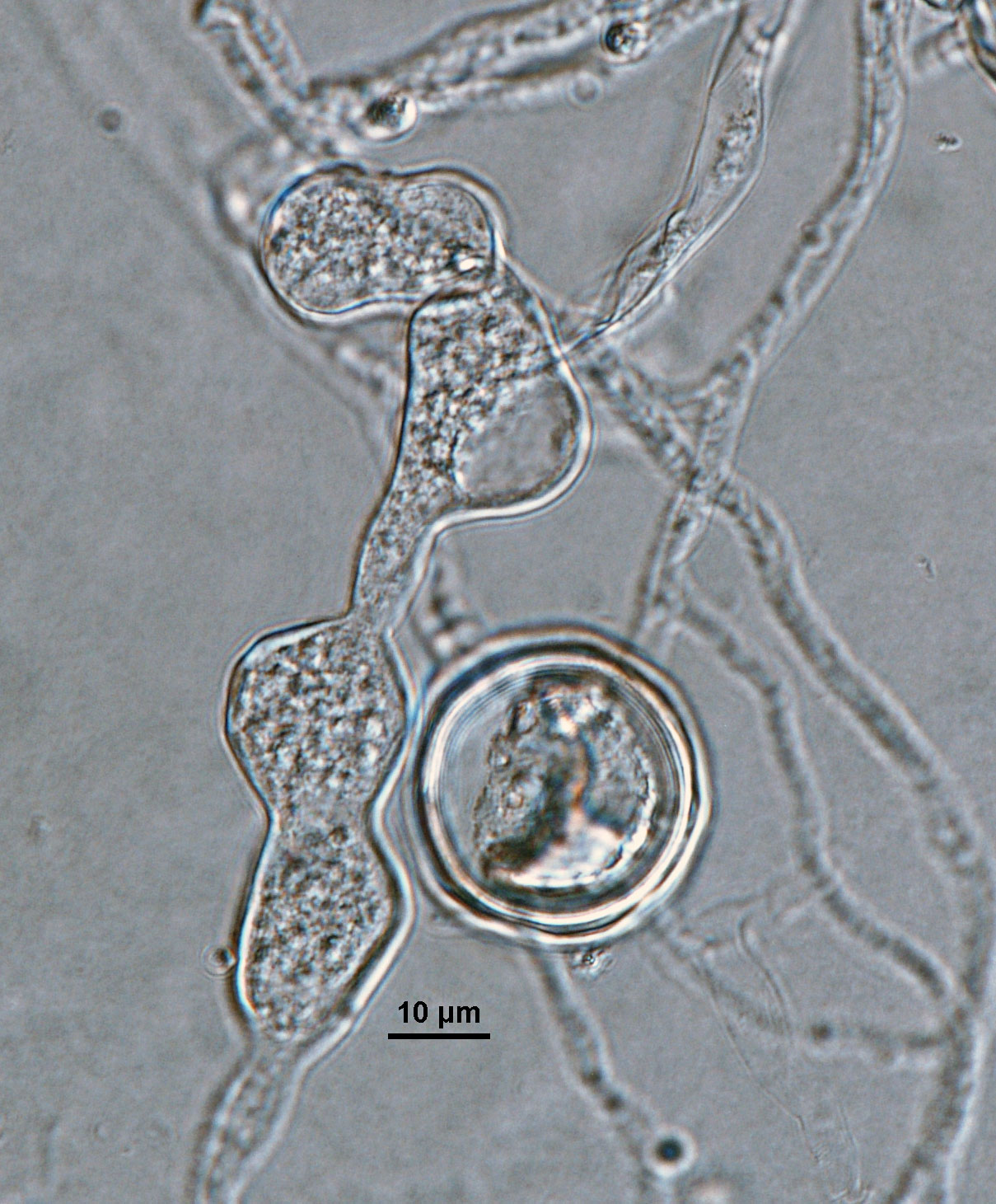 Phytophthora insolita (ex-type CPHST BL 144) asexual and sexual phases: hyphal swellings and oospores; photonbsp;by Gloria Abad, USDA-APHIS-PPQ.
Phytophthora insolita (ex-type CPHST BL 144) asexual and sexual phases: hyphal swellings and oospores; photonbsp;by Gloria Abad, USDA-APHIS-PPQ.
Phytophthora insolita (ex-type CPHST BL 144) asexual and sexual phases: hyphal swellings and oospores; photo by Gloria Abad, USDA-APHIS-PPQ.
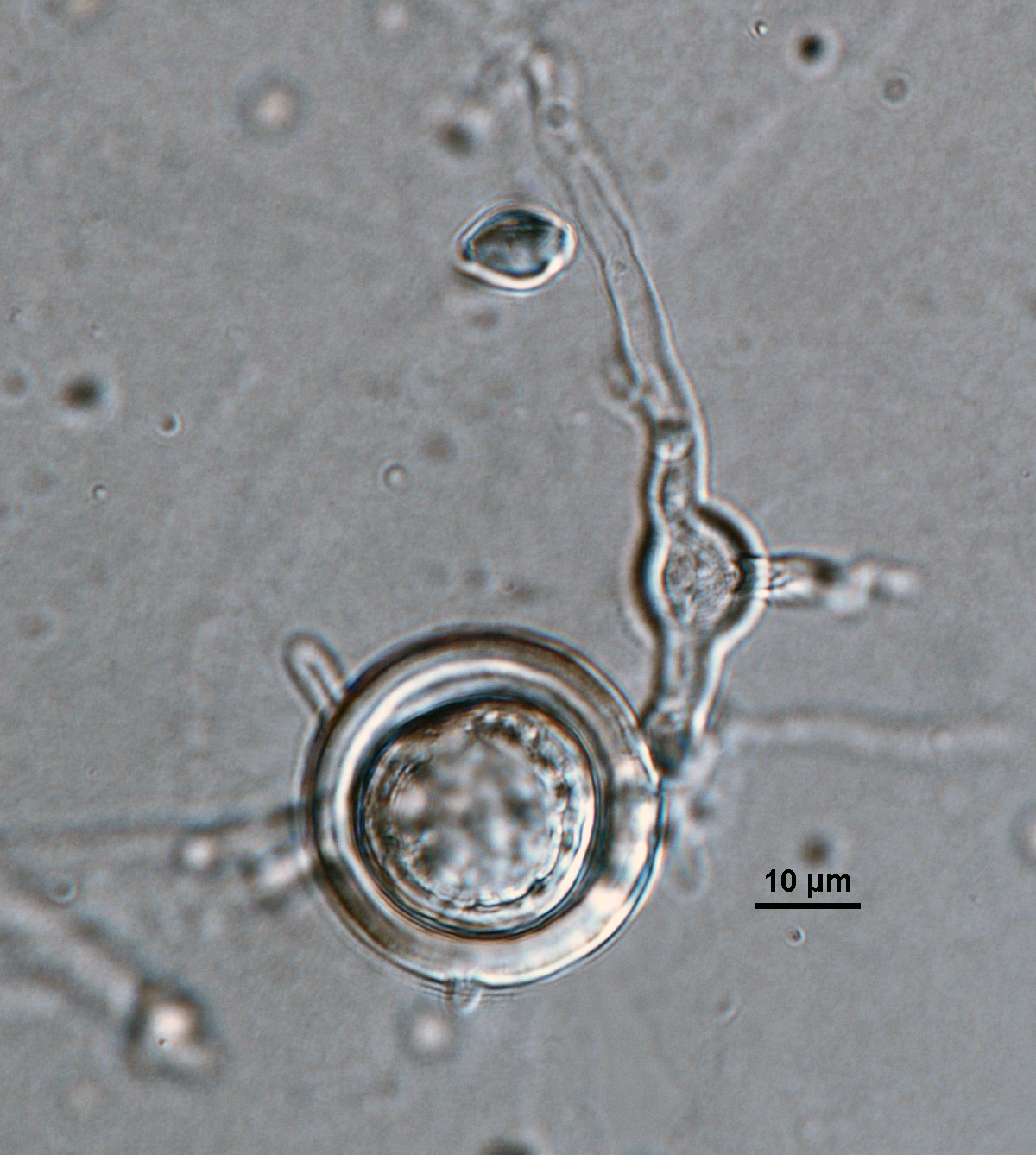 Phytophthora insolita nbsp;(ex-type CPHST BL 144) asexual and sexual phases: hyphal swellings and oospores; photonbsp;by Gloria Abad, USDA-APHIS-PPQ.
Phytophthora insolita nbsp;(ex-type CPHST BL 144) asexual and sexual phases: hyphal swellings and oospores; photonbsp;by Gloria Abad, USDA-APHIS-PPQ.
Phytophthora insolita (ex-type CPHST BL 144) asexual and sexual phases: hyphal swellings and oospores; photo by Gloria Abad, USDA-APHIS-PPQ.
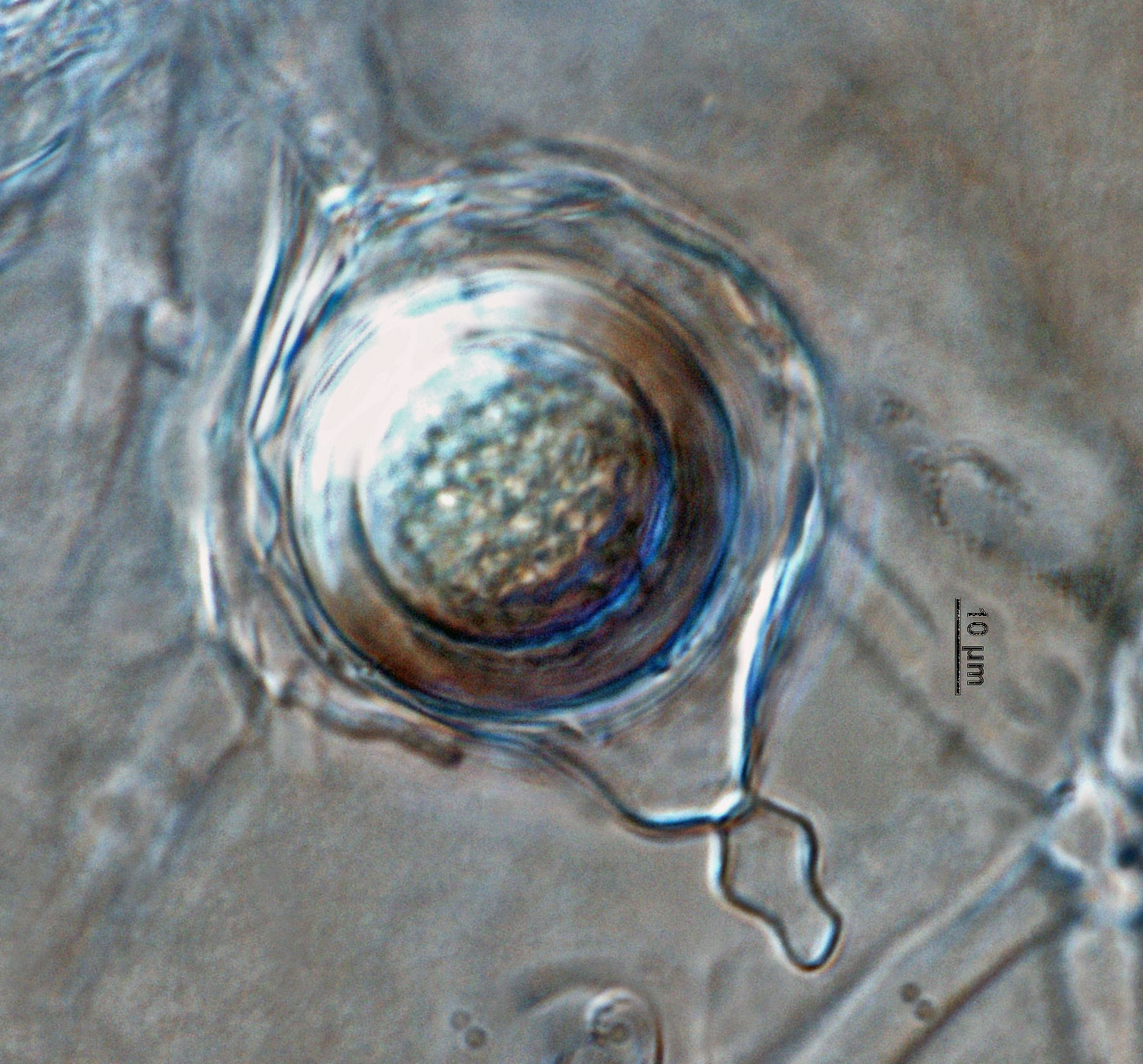 Phytophthora insolita nbsp;(ex-type CPHST BL 144):nbsp;sterile sexual stage without antheridia, rarely produced; photonbsp;by Gloria Abad, USDA-APHIS-PPQ.
Phytophthora insolita nbsp;(ex-type CPHST BL 144):nbsp;sterile sexual stage without antheridia, rarely produced; photonbsp;by Gloria Abad, USDA-APHIS-PPQ.
Phytophthora insolita (ex-type CPHST BL 144): sterile sexual stage without antheridia, rarely produced; photo by Gloria Abad, USDA-APHIS-PPQ.
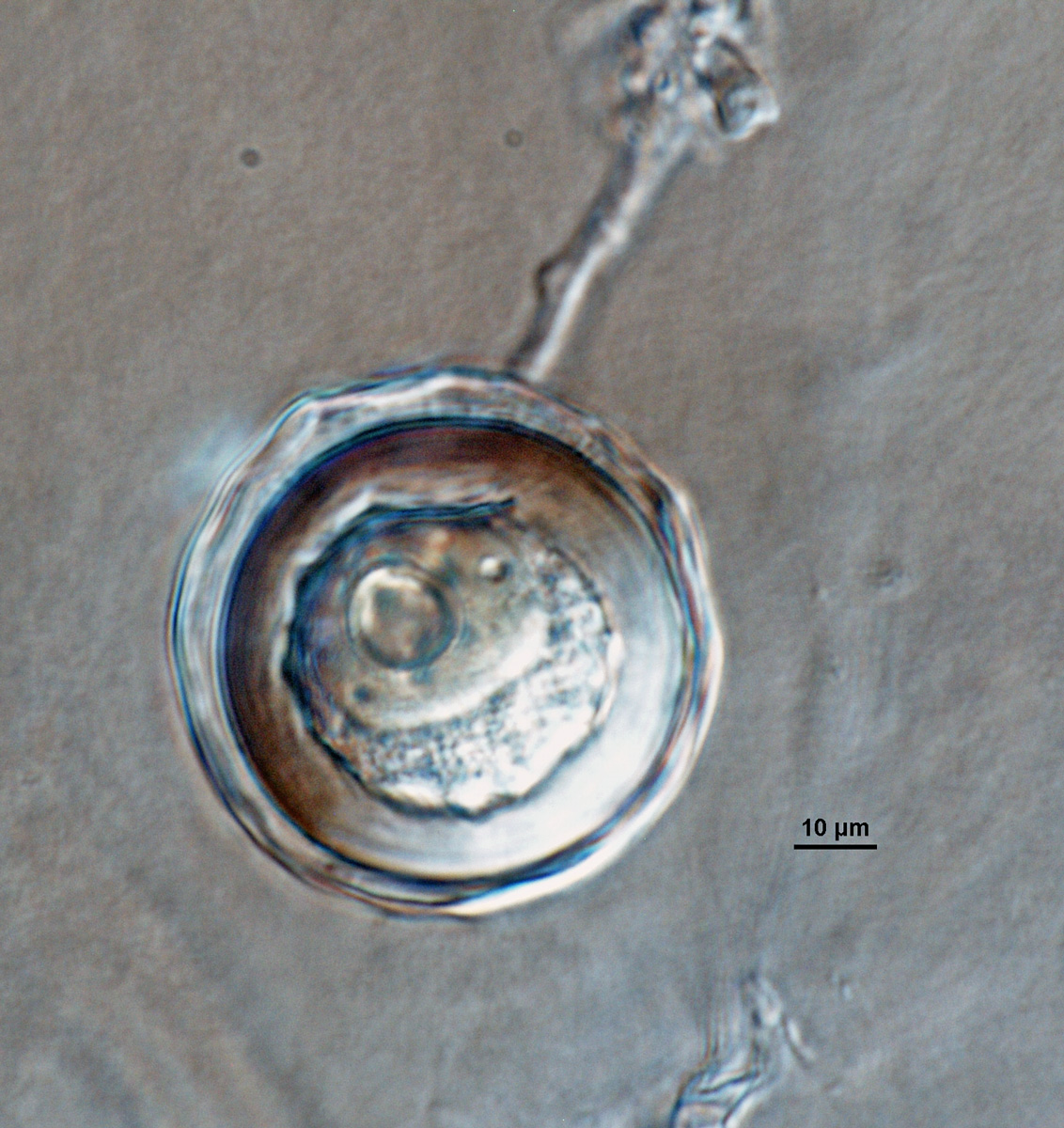 Phytophthora insolita nbsp;(ex-type CPHST BL 144) sexual phase: sterile sexual stage without antheridia, rarelynbsp;produced;nbsp;photo by Gloria Abad, USDA-APHIS-PPQ.
Phytophthora insolita nbsp;(ex-type CPHST BL 144) sexual phase: sterile sexual stage without antheridia, rarelynbsp;produced;nbsp;photo by Gloria Abad, USDA-APHIS-PPQ.
Phytophthora insolita (ex-type CPHST BL 144) sexual phase: sterile sexual stage without antheridia, rarely produced; photo by Gloria Abad, USDA-APHIS-PPQ.
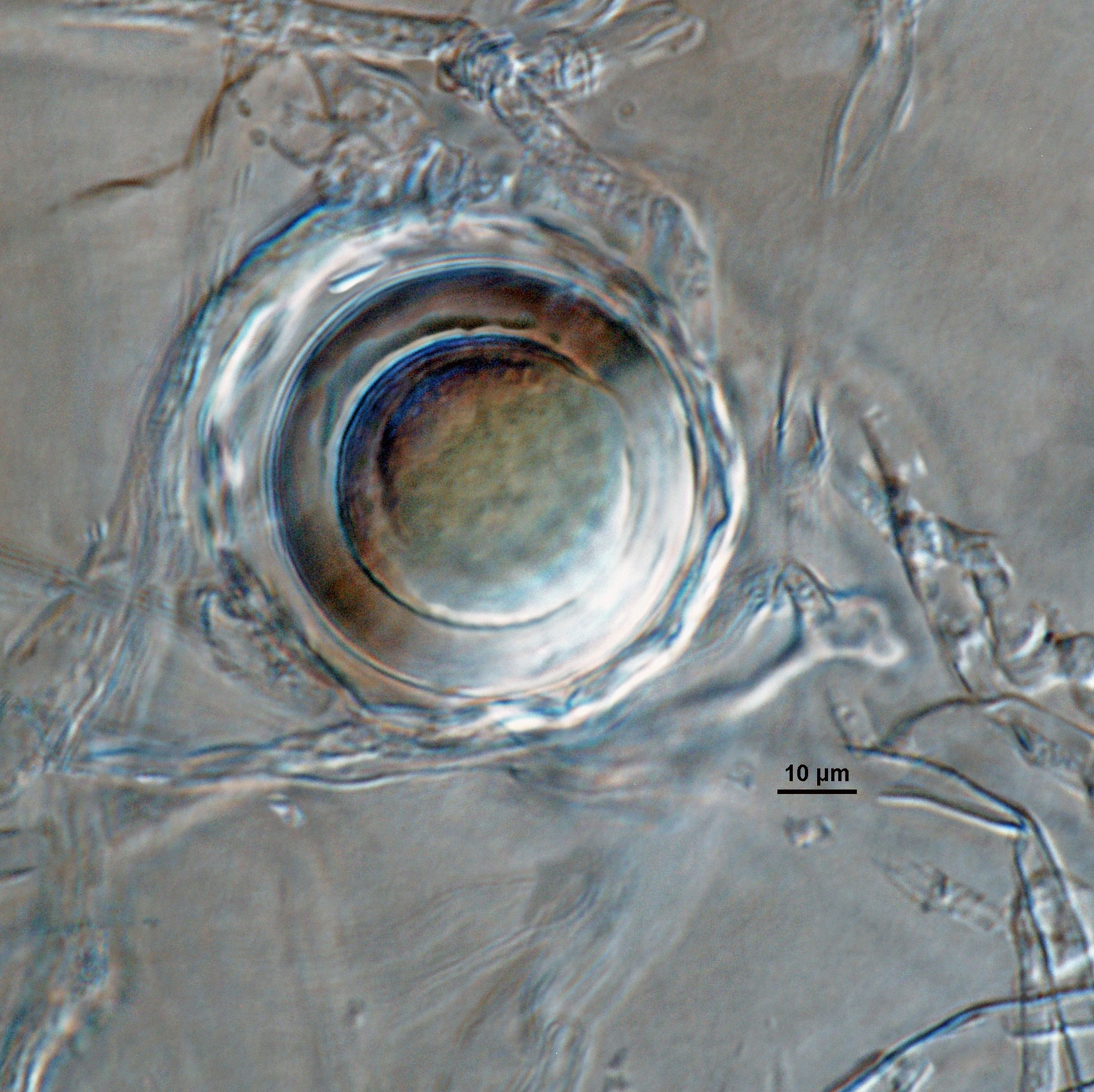 Phytophthora insolita nbsp;(ex-type CPHST BL 144) sexual phase: sterile sexual stage without antheridia, rarelynbsp;produced;nbsp;photo by Gloria Abad, USDA-APHIS-PPQ.
Phytophthora insolita nbsp;(ex-type CPHST BL 144) sexual phase: sterile sexual stage without antheridia, rarelynbsp;produced;nbsp;photo by Gloria Abad, USDA-APHIS-PPQ.
Phytophthora insolita (ex-type CPHST BL 144) sexual phase: sterile sexual stage without antheridia, rarely produced; photo by Gloria Abad, USDA-APHIS-PPQ.
Phytophthora spp. in subclade 2a: portion of the seven-loci ML phylogeny featuring the type cultures of 212 described species (by T. Bourret). Notice the position of P. insulinativitatica Ex-type CBS 146553. Gloria Abad, USDA S&T.
Phytophthora spp. in subclade 2a: Morphological Tabular key (PDF) and Tabular key legends (PDF) in IDphy2 KEY SECTION. Notice the data of P. insulinativitatica Ex-type CBS 146553. Gloria Abad, USDA S&T.
 colony morphology after 7 days growth at 20deg;C on carrot agar, potato-dextrose agar, malt extract agar, and V8 agar (from left to right)
colony morphology after 7 days growth at 20deg;C on carrot agar, potato-dextrose agar, malt extract agar, and V8 agar (from left to right)
colony morphology after 7 days growth at 20°C on carrot agar, potato-dextrose agar, malt extract agar, and V8 agar (from left to right)
mostly caducous, limoniform, papillate to semi-papillate sporangia; scale bar = 25µm
 oogonia with smooth walls containing plerotic oospores; antheridia both amphigynous and paragynous; scale bar = 25micro;m
oogonia with smooth walls containing plerotic oospores; antheridia both amphigynous and paragynous; scale bar = 25micro;m
oogonia with smooth walls containing plerotic oospores; antheridia both amphigynous and paragynous; scale bar = 25µm
Phytophthora spp. in subclade 10c: portion of the seven-loci ML phylogeny featuring the type cultures of 212 described species (by T. Bourret). Notice the position of P. intercalaris Ex-type CBS 140632. Gloria Abad, USDA S&T.
Phytophthora spp. in subclade 10c: Morphological Tabular key (PDF) and Tabular key legends (PDF) in IDphy2 KEY SECTION. Notice the data of P. intercalaris Ex-type CBS 140632. Gloria Abad, USDA S&T.


